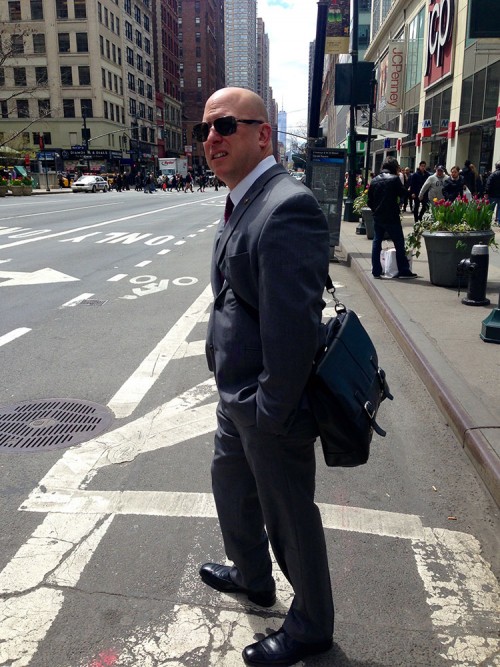Mike Rego’s path to the medical marijuana industry is unique. In a former life as a Newport, Rhode Island police officer (and later narcotics detective), he arrested cannabis producers – now he protects them.
His career in law enforcement began in 1993 as an officer for the Newport Police Department. In 1998 he was promoted to narcotics detective, a role he served in until 2010 when he was forced to retire following “numerous” knee surgeries. In an effort to treat his injuries he began acupuncture and it was his acupuncturist who ultimately approached him about working on a medical dispensary venture in Rhode Island.
“It started very organically,” Rego, 48, explained. “I was trying to get back to work at the time, he asked if I was interested in being on the board of directors – I said, ‘sure.’”

During the transition into what would eventually develop into his second career, Rego became a licensed caregiver in Rhode Island. The first individual he treated was a friend’s brother who suffered from multiple sclerosis.
“I saw a remarkable, dramatic improvement in the quality of his life from marijuana,” he said. “It became crystal clear to me.”
At first, he considered the medical marijuana industry to be a job that would “tide him over” until he and an associate got a leadership training business off the ground. But his roles as a caregiver and board member soon morphed into dispensary work and sometimes consultant for marijuana startups. Seeing the health benefits first hand made him more active in the community and soon the benefits of recreational use would become apparent as his two sons, now 23 and 21, reached legal drinking age.
“I’ve seen the devastating effects of alcohol and other hard drugs – but mostly alcohol – and there is no comparison between marijuana and alcohol,” Rego said. “It was a very easy leap for me to recognize that – not only from a purely medical standpoint, but recreationally it pales in comparison to what happens when people are under the influence of alcohol.”
Rego admits that as a law enforcement officer he didn’t believe that marijuana was a viable medical option, saying that the law enforcement “culture” he was in didn’t endorse that line of thinking. Although, he said, during his time busting drug criminals, marijuana was viewed as “more of a nuisance” than other illicit drugs such as heroin, which he considers a “huge problem” in the Northeast.
Recently Rego has stepped away from his caregiver role in order to focus more on his second career – securing medical marijuana dispensaries and cultivation sites, consultation for potential and active cannabis businesses , and outreach with town boards and local police departments in municipalities that could host a cannabusiness.
His first security consulting gig was with Greenleaf in Rhode Island, where he served as the dispensary’s head of security. Rego’s primary responsibility is setting up both the technology, and the people, to secure a site. He says that technology is usually enough to thwart would-be thieves and in the event they successfully enter the site, it’s almost guaranteed they will get caught on camera. He does employ guards, who are not armed because, he says, adding a firearm will likely just escalate a situation. Instead, he trains those working inside of dispensaries and interacting with patients to de-escalate situations. Some of the most prevalent problems, according to Rego, are employee diversion – stealing to sell on the black market – curiosity seekers, and individuals who want to hang out at the dispensary. In New York, where Rego is presently working with Etain, LLC, the medical marijuana products are less desirable on the black market, making security at dispensaries slightly easier.
The first thing Rego looks for in his security staff is an understanding of the culture. They need to be empathetic while keeping a safe and comfortable environment. Historically he has hired people with a law enforcement background because “they are used to dealing with the public in stressful situations,” but instructs his staff to only call the police “as a last step if something goes really wrong.”
“You’re dealing with, often, medically compromised individuals,” he said. “You need to be very mindful of the complications that come along with that… It’s an environment that, very much, needs to be kept in a medical setting.”
His advice to those interested in getting into the security aspect of the medical marijuana industry is this: become valuable. Rego credits his success to having been a law enforcement officer and working in a dispensary and as a caregiver. Whether the individual has a degree in criminal justice or law enforcement experience he encourages them to “get their foot in the door” at a dispensary or a cultivation site. Since there is no uniform or formal training, yet, the best way to learn how the industry works it by doing, which Rego says might not be the best financial decision at first, but “it’s kind of like school.”
“You’re learning the language, the culture, learning peripherally what it takes to grow – these are all beneficial things if you want to move forward,” he said. “I want, as much as I can, to influence people to look at this differently. It’s not what you see on TV – it’s not a big stoner mentality.”
In order to destigmatize the industry Rego sometimes acts as a liaison between business owners and the police department, trying to educate them on how to handle medical marijuana patients. As a former cop, he often lends “an air of credibility” for police officers, which helps breed the culture he is looking to build in the regions he works.
“You have to have a certain skillset that goes between analytical intelligence and social intelligence,” Rego said. “You get the skillset to know what you’re talking about from the security end and you can also play golf with the CEO, and then maybe grow some plants with the growers, it’s all hands on deck – to me that’s the culture.”
Photo Credits: Mike Rego, CWCS Managed Hosting
Get daily cannabis business news updates. Subscribe
End



